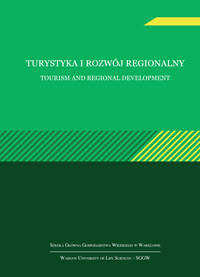Main Article Content
Article Details
Beveridge, C. (2022). What is User-Generated Content? And Why is it Important? Hootsuite. [Dostęp: 06.09.2022] https://blog.hootsuite.com/user-generated-content-ugc.
Contente, I. (2011). Word of Mouth in the tourism industry: an empirical investigation of Service ex¬perience. Proceedings of the 14th Toulon-Verona/ICQSS Conference - Excellence in services - at the University of Alicante. Spain, s. 1-13.
Dabija, D., Brandusa, B., Tipi, N. (2018). Generation X versus Millennials communication behaviour on social media when purchasing food versus tourist services. E a M: Ekonomie a Management, 21 (1), s. 191-205. DOI: https://doi.org/10.15240/tul/001/2018-l-013 (Crossref)
Digital Marketing Institute (2019). 11 Digital Marketing Campaign Tips for the Tourism Sector (Part I), April 12. Pobrano z: https://digitalmarketinginstitute.com (dostęp: 18.01.2022).
Filieri, R. (2016). What makes an online consumer review trustworthy? Annals of Tourism Research, 58, s. 46-64. DOI: https://doi.Org/10.1016/j.annals.2015.12.019 (Crossref)
Gretzel, U., Yoo, K. (2008). Use and Impact of Online Travel Reviews. Laboratory for Intelligent Sys¬tems in Tourism. Conference: Information and Communication Technologies in Tourism, ENTER 2008. Proceedings of the International Conference in Innsbruck, Austria, s. 35-46. DOI: https:// doi.org/10.1007/978-3-211-77280-5_4 (Crossref)
Kim, Ch., Jin, M., Kim, J., Shin, N. (2012). User Perception Of The Quality, Value, and Utility of User- Generated Content. Journal of Electronic Commerce Research, 13 (4), s. 305-319.
Kotler, Ph., Keller, K. (2012). Marketing. Poznań: Wydawnictwo Rebis.
Merriam-Webster (2022). Definition of content analysis. Pobrano z: https://www.merriam-webster. com/dictionary/content%20analysis (dostęp: 15.09.2022).
Narangajavana, Y., Fioł, L, Tena, M., Artola, R., Garcia, J. (2017). The influence of social media in creat¬ing expectations. An empirical study for a tourist destination. Annals of Tourism Research, 65, s. 60-70. DOI: https://doi.Org/10.1016/j.annals.2017.05.002 (Crossref)
Osterwalder, A. (2004). The business model ontology a proposition in a design science approach. Uni¬versite de Lausanne Ecole des Hautes Etudes Commerciales, These.
Panasiuk, A. (2011). Ekonomika turystyki i rekreacji. Warszawa: Wydawnictwo Naukowe PWN.
Park, H., Xiang, Z., Josiam, B., Kim, H. (2013). Personal Profile Information as Cues of Credibility in On¬line Travel Reviews. Anatolia: An International Journal of Tourism and Hospitality Research, 25, s. 13-23. DOI: https://doi.org/10.1080/13032917.2013.820203 (Crossref)
Pinto, I., Castro, C. (2019). Online travel agencies: factors influencing tourists' purchase deci¬sions. Tourism & Management Studies, 15 (2), s. 7-20. DOI: https://doi.org/10.18089/ tms.2019.150201 (Crossref)
Psefti, D., Poulaki, I., Papaioannou A., Katsoni, V. (2021). The Evolution of Online Travel Agencies in the Last Decade: E-Travel SA as an Exceptional Paradigm. W: V. Katsoni, C. Zyl (red.). Culture and Tourism in a Smart, Globalized, and Sustainable World, s. 625-633. DOI: https://doi.org/ 10.1007/978-3-030-72469-6_40 (Crossref)
Sheldon, P. (2006). Tourism information technology. W: L. Dwyer, P. Forsyth (red.). International Hand¬book on the Economics of Tourism. Northampton: Edward Elgar Publishing, s. 410-415.
Stada (2019). Consumer & Marketer Perspectives on Content in the Digital Age. Report 2019. Pobrano z: https://www.nosto.com/wp-content/uploads/2019/02/Data-Report-2019-FINAL-FINAL.pdf. (dostęp: 18.09.2022).
Turban, E. (2006). Electronic Commerce 2006. A Managerial Perspective. Pearson Education.
Downloads
- Anna Grontkowska, Regionalne zróżnicowanie pogłowia zwierząt w Polsce , Turystyka i Rozwój Regionalny: Nr 18 (2022)
Możesz również Rozpocznij zaawansowane wyszukiwanie podobieństw dla tego artykułu.
- Dariusz Strzębicki, Recenzje internautów jako wyznacznik jakości usług turystycznych w portalu Airbnb , Turystyka i Rozwój Regionalny: Nr 20 (2023)
- Dariusz Strzębicki, Rola i zróżnicowanie postów facebookowych w komunikacji marketingowej biur podróży , Turystyka i Rozwój Regionalny: Nr 22 (2024)

Utwór dostępny jest na licencji Creative Commons Uznanie autorstwa – Użycie niekomercyjne 4.0 Międzynarodowe.





